Blinken Highlights 'Extraordinary' Chance For Israeli Normalization
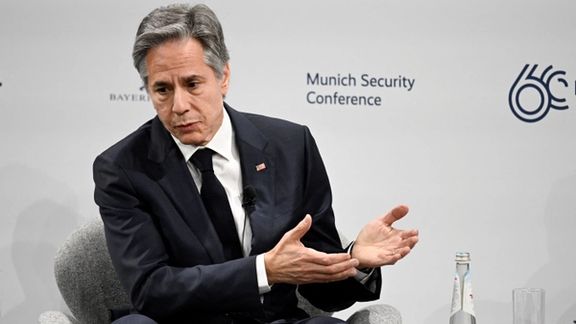
US Secretary of State Antony Blinken has underscored a significant opportunity for Israel to normalize relations with its Arab neighbors.

US Secretary of State Antony Blinken has underscored a significant opportunity for Israel to normalize relations with its Arab neighbors.
Speaking at the annual Munich Security Conference, Blinken noted genuine efforts by Arab nations to bolster the Palestinian Authority, enabling it to better serve the Palestinian people.
"Virtually every Arab country now genuinely wants to integrate Israel into the region to normalize relations...to provide security commitments and assurances so that Israel can feel more safe."
"And there's also, I think the imperative, that's more urgent than ever, to proceed to a Palestinian state that also ensures the security of Israel," he added.
The Biden administration is actively pursuing a substantial agreement to normalize relations between Saudi Arabia and Israel, with Arab nations advocating for a Palestinian state as part of the deal.
The agreement regarding hostages of the October 7 surprise attack and the temporary humanitarian ceasefire are viewed as pivotal in facilitating progress towards discussions on a normalization agreement between Saudi Arabia and Israel. These talks were initially halted in the aftermath of the attack but have since resumed in recent months.
Discussions are ongoing regarding Gaza's post-conflict future, reforms within the Palestinian Authority to potentially govern the region, and establishing a pathway for a Palestinian state, according to US officials.
Iran's proxies in Syria, Iraq, Lebanon and Yemen have joined Hamas's war on Israel and US interests in the region since October 7 when Gaza-based Hamas invaded Israel.
Iran continues to deny its involvement in the atrocities of October 7 in which 1,200 mostly civilians were murdered by Hamas and another 250 or more taken hostage to Gaza. However, Tehran continues its very public, high level engagement with Palestinian militant groups which it has for years funded, armed and trained.
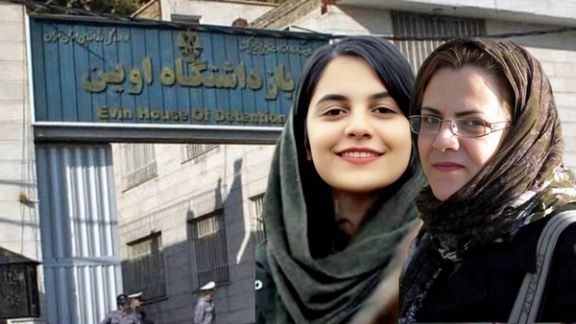
Marzieh Farsi and Forough Taghipour, two female Iranian political detainees held in Evin Prison, have been handed down 15-year prison sentences each by the Tehran Revolutionary Court.
According to reports from the US-based Human Rights Activists News Agency (HRANA), Farsi and Taghipour, previously charged with "armed rebellion," were convicted for alleged affiliation with anti-government groups in a joint case.
Their trial was conducted without their presence in court, as they refused to recognize the court's legitimacy and opted out of attending the session.
The two women were arrested on August 21 in Tehran, both having a history of detention and imprisonment for their activism.
HRANA underscored that Farsi is battling cancer and is in poor physical health.
In addition, Parvin Mir-Asan, a 66-year-old political detainee involved in the 2022 protests, remains incarcerated in Evin Prison for 15 months and 15 days without a trial and an end in sight. Informed sources reveal Mir-Asan's health issues, including diabetes, Parkinson's disease, joint problems, and neurological disorders, exacerbated by the lack of proper medical care.
The Islamic Republic has persistently detained, tortured, and imprisoned civil and political dissidents since its establishment.
The nationwide uprising against the Islamic Republic since September 2022 has witnessed escalated government repression against civil, political activists, and protesters, continuing unabated.
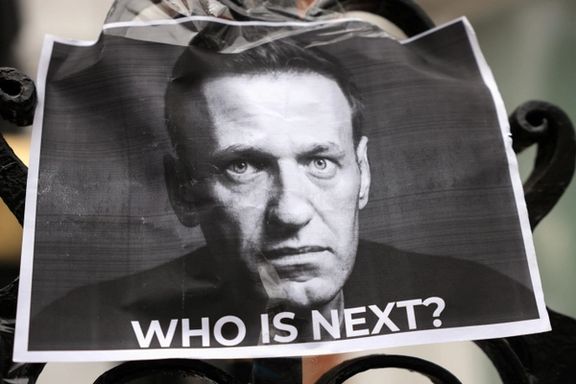
Iranian opposition activists have unequivocally condemned the sudden suspicious death of Alexei Navalny, an outspoken critic of Russian President Vladimir Putin.
The Iranian regime is a close ally of Vladimir Putin, while opposition activists see the relationship as an unholy alliance between two brutal dictatorships.
Citing figures provided by World Liberty Congress as to the existence of over one million political prisoners around the world, prominent Iranian dissident Masih Alinejad criticized the inaction of democratic countries.
“Navalny's murder is a chilling reminder of how authoritarian regimes can kill innocent political prisoners while democratic countries are busy with empty condemnations,” she wrote on X, adding that “Putin, Khamenei and other dictators are not only killing dissidents within their countries but they are working together.”
“The alliance of dictators is the real threat facing global security. The problem is clear: when it comes to taking action, dictators are more united and determined than democratic countries,” she further remarked.
Hamed Esmaeilion, another opposition figure, hailed Navalny as a hero and stated that biological terror, exile and prison all failed to silence his voice in the struggle for freedom.
He will be remembered for his greatness and courage contrary to such criminal dictators as Vladimir Putin, Ali Khamenei and Bashar al-Assad who belong to the abyss of history, Esmaeilion pointed out.
Mehrangiz Kar, lawyer and human rights activist, referred to the incident as a murder and said, “Putin, Khamenei’s mentor, killed Navalny, this great man.”
Actress and political activist Nazanin Boniadi urged democracies to take action against the killings of political prisoners by dictators.
“If democracies don’t stand united, autocracies will continue to murder their critics with impunity. Every freedom loving human should turn their outrage into action,” she wrote on X. Many ordinary Iranians also expressed their outrage on social media, likening the Iranian regime to Putin's dictatorial system.
However, the media close to the Iranian regime and the IRGC have been largely silent on Navalny's death. Fars news agency, affiliated with the IRGC, chose not to cover his death at all.
IRNA, the Iranian state news agency, dedicated its coverage of the incident only to the official stance of Russia, reactions of the international community and reports of arrests made during the vigils held in Russia to commemorate the leader of the opposition.
The same kind of coverage can be traced in Mehr news agency, close to Iran’s hardliners, which only reported Navalny’s death, international condemnations and Russia’s responses. Reflecting the remarks of Russian ambassador to Washington Anatoly Antonov, Mehr entitled one of its reports on the incident as “the US’ attempt to interfere with Russia’s internal affairs following Navalny’s death.”
IRGC-affiliated Tasnim news agency also employed the same reporting but not commenting strategy. In a short 7-paragraph report titled “Putin’s pro-West opponent dies: Who was Alexei Navalny?” Tasnim simply wrote about his trials and sentences.
The relatively more independent media in Iran, nonetheless, used a more analytical and investigative approach to Navalny’s demise.
Khabaronline traditional-conservative website mentioned the remarks of Ahmad Zeidabadi, a commentator in Tehran.
“Accepting that Navalny died of natural causes in a Russian prison is like accepting that Putin has fulfilled his repeated promises not to attack Ukraine,” Zeidabadi said, further adding that “the world is becoming a more cruel place day by day and Putin and Putinism play a significant role in this process.”
“It is as if the continuous rise and fall of autocratic leaders and regimes in Russia is the destiny of this great and genius-breeding country. May God save it,” he went on to say.
Reformist daily Shargh published an article entitled “Navalny and the Russian syndrome.” Referring to the fates of the prominent Putin critics such as Alexander Litvinenko, Yevgeny Prigozhin, Sergei Skripal, Alexander Perepilichny and Vladimir Kara-Murza, Shargh ironically attributed the incidents to “a Russia syndrome which affects Putin’s opponents.”
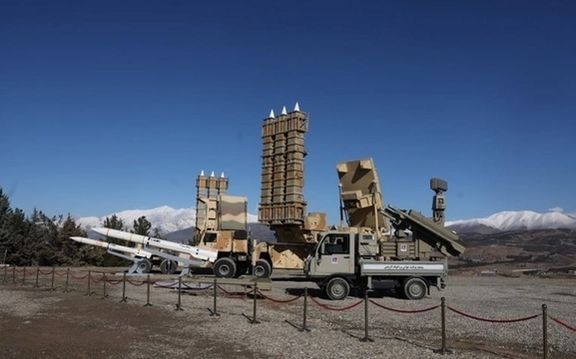
Amid international concerns, Iran on Saturday showcased new weaponry including the Arman anti-ballistic missile system and the Azarakhsh low-altitude air defense system.
The unveiling ceremony for the two vehicle-mounted systems was attended by Iranian Defense Minister Brigadier General Mohammad Reza Ashtiani, as reported by the official IRNA state news agency.
"With the entry of new systems into the country's defense network, the air defense capability of the Islamic Republic of Iran will increase significantly," IRNA said.
It said the Arman missile system "can simultaneously confront six targets at a distance of 120 to 180 km", while the Azarakhsh missile system "can identify and destroy targets... up to a range of 50 km with four ready-to-fire missiles".
Iran often announces the introduction of new military technologies and weapons that is difficult to independently verify.
The claim comes amidst escalating tensions in the region, with Iran-backed Houthi militants in Yemen conducting a series of attacks on commercial and naval vessels in the Red Sea, in solidarity with Hamas. In response, the US targeted sites in Yemen and facilities of Iran-backed groups in Iraq and Syria. US military bases in Syria and Iraq have also been attacked, while Israel has carried out strikes on Iranian targets in Syria.
In June, Iran unveiled what officials described as its first domestically produced hypersonic ballistic missile, named Fattah, with a range of 1,400 km. Iran claims that its ballistic missiles serve as a deterrent and retaliatory force against the United States, Israel, and other potential regional adversaries.
Iran's nuclear program was constrained by the 2015 nuclear agreement, which the United States withdrew from in 2018, thereby prolonging the time required for Tehran to develop nuclear material for weapons.
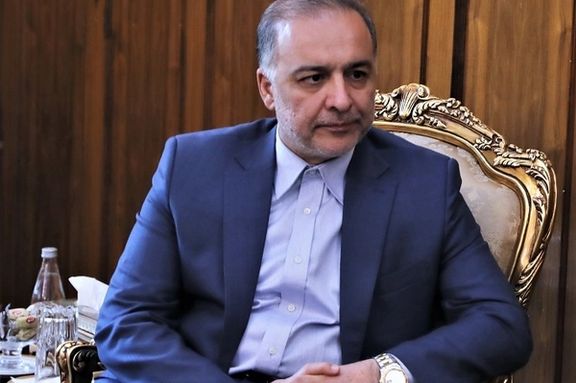
After warnings by Armenia of a fresh Azerbaijani military threat, Iran's Ambassador in Yerevan, Mehdi Sobhani, has reiterated Tehran's stance against any territorial alterations in the region.
In an interview with Armenpress, Sobhani emphasized, “The final position of the Islamic Republic of Iran is that we cannot accept a territorial change in any way. Any territorial changes should take place on the basis of mutual recognition of the territorial integrity of both countries, and this remains our final position...the territorial integrity of the countries of the region should be respected."
Expressing concern over regional stability, the Iranian diplomat stated that Tehran finds it “unacceptable” to witness a volatile situation around Armenia.
His comments come as tensions between Armenia and Azerbaijan continue to escalate. Armenian Prime Minister Nikol Pashinian on Thursday rejected Azerbaijan's persistent demands for legislative changes in Armenia, warning of potential "large-scale" military aggression from Baku.
Pashinian accused Azerbaijani leadership of pursuing a "policy of military coercion" to seize Armenian territory and extract concessions. He highlighted Azerbaijan's reluctance to demarcate the border, following a ceasefire violation that resulted in the death of four Armenian soldiers on Tuesday.
Azerbaijani President Ilham Aliyev on Wednesday maintained his stance, stating that he won't sign a peace treaty unless Armenia revises its legislation, which he claims contains territorial claims on Azerbaijan.
Amidst the tension, Iranian President Ebrahim Raisi reaffirmed Tehran's opposition to the presence of external powers in the South Caucasus during discussions with a senior visiting Armenian official.
Iran supports Armenia's stance against Azerbaijani requests for an extraterritorial corridor linking Azerbaijan to its Nakhichevan exclave via Syunik, the sole Armenian region sharing a border with the Islamic Republic.

British Foreign Secretary David Cameron has urged China to exert its influence over its ally Iran to put an end to Yemeni Houthis’ attacks on shipping in the Red Sea.
Camron made the call during his meeting with Chinese Foreign Minister Wang Yi on the sidelines of the Munich Security Conference on Friday, as Houthis continued firing missiles at commercial vessels.
In the meeting, Wang stressed the importance of “the convergence of interests” between London and Beijing, adding that the two sides can play significant roles to promote security and peace.
Yemeni Houthis launched their campaign to target shipping lanes in the Red Sea, the Gulf of Aden, and the Bab el-Mandeb Strait after Iran’s Supreme Leader Ali Khamenei in early November urged Muslims to initiate a blockade of Israel. Houthis claim they only target Israeli and Israel-bound ships, but the attacks have proven to be more random.
Though Iran has avoided any direct military involvement in the Israel-Hamas conflict, the regime has used its proxy groups such as Houthis and Hezbollah to attack Israeli and American targets in the region.
The US State Department announced on Friday that a missile hit an India-bound oil tanker in the Red Sea.
The vessel identified as M/T Pollux was struck with a missile launched from the Yemeni territories, the State Department added. The Panamanian-flagged tanker was carrying crude oil, the report added.
"This is yet another example of the lawless attacks on international shipping, which continue after numerous joint and international statements calling the Houthis to cease," remarked a State Department spokesperson.
Yemeni Houthis claimed responsibility for the attack on Saturday, saying the oil tanker was owned by Britain.
“The naval forces of the Yemeni Armed Forces carried out a targeting operation against a British oil ship (Pollux) in the Red Sea with a large number of appropriate naval missiles, and the strikes were accurate and direct,” read a statement issued by the Houthis’ military spokesperson Yahya Sarea.
Meanwhile, AFP reported that the EU next week will officially announce the launch of the bloc’s naval mission in the Red Sea as part of the international campaign to stop the destabilizing actions of Iran-backed Houthis.
Germany, Belgium, France and Italy have agreed to contribute vessels to the mission, which is termed Aspides, meaning shield in Greek. At least four vessels are to take part in Aspides, an EU official said.
“The overall commander of the mission will be Greek, while the head officer in operation control at sea will be Italian,” the EU official went on to say.
The United States also launched in December a multinational naval coalition in the Red Sea to protect trade vessels. According to Reuters, 20 countries, including Britain, Norway, Seychelles, France, the Netherlands, Australia and Italy, have joined the coalition.
Amid mounting international pressures on Iran’s proxy group, the US Department of Treasury announced that Washington’s sanctions against Houthis as a Specially Designated Global Terrorist (SDGT) have been officially enforced on Friday.
Last month, the Biden administration listed Houthis as Specially Designated Global Terrorist in response to the group’s rising threats in the region. Washington, however, has not decided yet to include Houthis in the list of foreign terrorist organizations (FTO).
The Biden administration delisted the Houthis in 2021 as both a foreign terrorist organization and as a specially designated global terrorist entity.
On January 10, the UN Security Council passed a resolution, calling on Houthis to stop attacks on shipping immediately.
Two days after the resolution was approved, the US and UK targeted dozens of Houthis’ sites in Yemen. The two countries have launched several other rounds of preemptive offensives against the group’s targets in Yemen in an attempt to decrease its military capabilities.